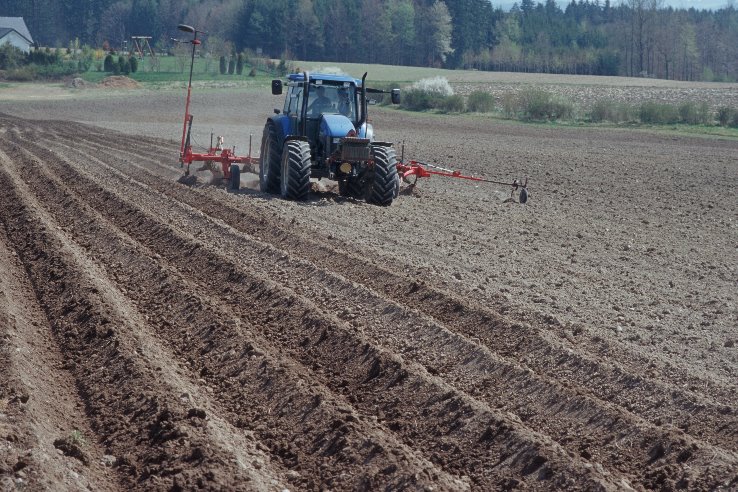News of Organic Industry
Breakthrough study shows organic cuts agriculture’s contribution to climate change

Healthy organic soils can combat climate change (photo Oekolandbau.de)
A new research by The Organic Center and Northeastern University proves organic agriculture keeps more carbon in soil and out of atmosphere and helps to fight climate change. The groundbreaking study proves soils on organic farms store away appreciably larger amounts of carbons – and for longer periods - than typical agricultural soils. The important study, directed by Northeastern University in collaboration with The Organic Center, provides a new significant proof point that organic agricultural practices build healthy soils and can be part of the solution in the fight on global warming.
The study is based on one of the largest field studies of its kind ever conducted. One of its most compelling findings is that on average, organic farms have 44% higher levels of humic acid -the component of soil that sequesters carbon over the long term - than soils not managed organically. The new data will be published in the Oct.1 issue of the scientific journal Advances in Agronomy.
Farmer samples show organic stores more carbon
This is the first time scientific research has given an accurate picture of the long-term soil carbon storage on organic versus conventional farms throughout the U.S., since most studies focus on individual farms or total soil organic carbon. The Organic Center’s study takes farms from around the nation into account and looks at the most accurate measure of carbon sequestration.
The study shows that the components of humic substances – fulvic acid and humic acid - were consistently higher in organic than in conventional soils.
The research found that, on average, soils from organic farms had:
• 13 percent higher soil organic matter
• 150 percent more fulvic acid
• 44 percent more humic acid
• 26 percent greater potential for long-term carbon storage
Groundbreaking Study
“This study is truly groundbreaking,” said Dr. Jessica Shade, Director of Science Programs for The Organic Center. “We don’t just look at total soil organic carbon, but also the components of soil that have stable pools of carbon – humic substances, which gives us a much more accurate and precise view of the stable, long-term storage of carbon in the soils.”
“To our knowledge, this research is also the first to take a broad-view of organic and conventional systems, taking into account variation within management styles, across crops, and throughout the United States. It gives a large-scale view of the impact of organic as a whole, throughout the nation,” said Dr. Shade.“Our study compares soils from the real world, and its findings can have a huge impact on the real world,” said Dr. Shade. “These results highlight the potential of organic agriculture to increase the amount of carbon sequestration in the soil, and by doing so, help decrease a major cause of climate change.”
For more information visit The Organic Center
The Organic Center’s mission is to convene credible, evidence-based science on the health and environmental benefits of organic food and farming, and to communicate the findings to the public. The Center is an independent non-profit research and education organization operating under the administrative auspices of the Organic Trade Association.
A new research by The Organic Center and Northeastern University proves organic agriculture keeps more carbon in soil and out of atmosphere and helps to fight climate change. The groundbreaking study proves soils on organic farms store away appreciably larger amounts of carbons – and for longer periods - than typical agricultural soils. The important study, directed by Northeastern University in collaboration with The Organic Center, provides a new significant proof point that organic agricultural practices build healthy soils and can be part of the solution in the fight on global warming.
The study is based on one of the largest field studies of its kind ever conducted. One of its most compelling findings is that on average, organic farms have 44% higher levels of humic acid -the component of soil that sequesters carbon over the long term - than soils not managed organically. The new data will be published in the Oct.1 issue of the scientific journal Advances in Agronomy.
Farmer samples show organic stores more carbon
This is the first time scientific research has given an accurate picture of the long-term soil carbon storage on organic versus conventional farms throughout the U.S., since most studies focus on individual farms or total soil organic carbon. The Organic Center’s study takes farms from around the nation into account and looks at the most accurate measure of carbon sequestration.
The study shows that the components of humic substances – fulvic acid and humic acid - were consistently higher in organic than in conventional soils.
The research found that, on average, soils from organic farms had:
• 13 percent higher soil organic matter
• 150 percent more fulvic acid
• 44 percent more humic acid
• 26 percent greater potential for long-term carbon storage
Groundbreaking Study
“This study is truly groundbreaking,” said Dr. Jessica Shade, Director of Science Programs for The Organic Center. “We don’t just look at total soil organic carbon, but also the components of soil that have stable pools of carbon – humic substances, which gives us a much more accurate and precise view of the stable, long-term storage of carbon in the soils.”
“To our knowledge, this research is also the first to take a broad-view of organic and conventional systems, taking into account variation within management styles, across crops, and throughout the United States. It gives a large-scale view of the impact of organic as a whole, throughout the nation,” said Dr. Shade.“Our study compares soils from the real world, and its findings can have a huge impact on the real world,” said Dr. Shade. “These results highlight the potential of organic agriculture to increase the amount of carbon sequestration in the soil, and by doing so, help decrease a major cause of climate change.”
For more information visit The Organic Center
The Organic Center’s mission is to convene credible, evidence-based science on the health and environmental benefits of organic food and farming, and to communicate the findings to the public. The Center is an independent non-profit research and education organization operating under the administrative auspices of the Organic Trade Association.
Tags: organic farm , climate change , carbon , groundbreaking study









